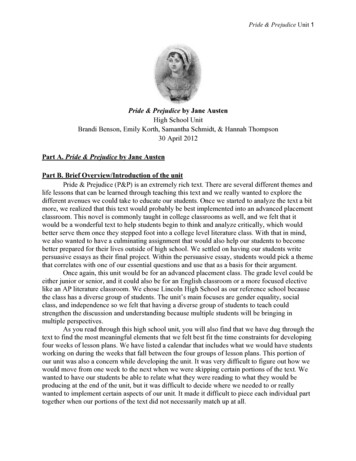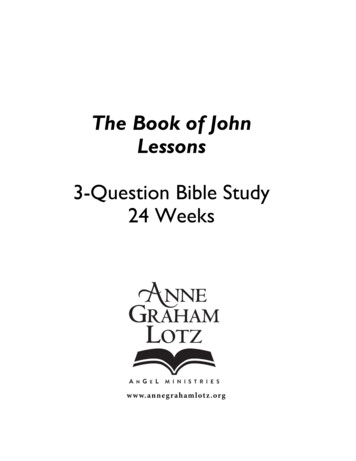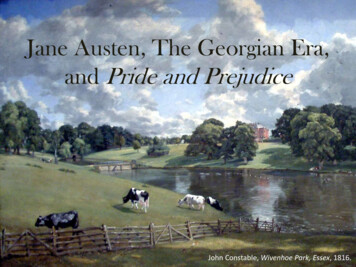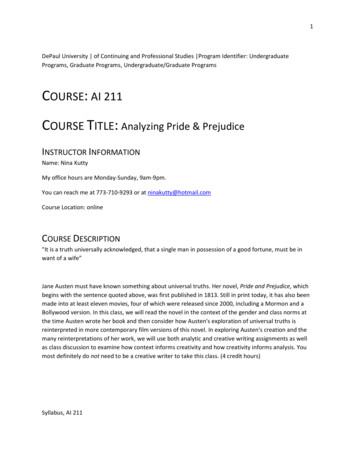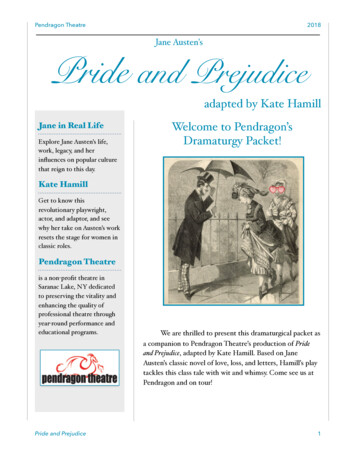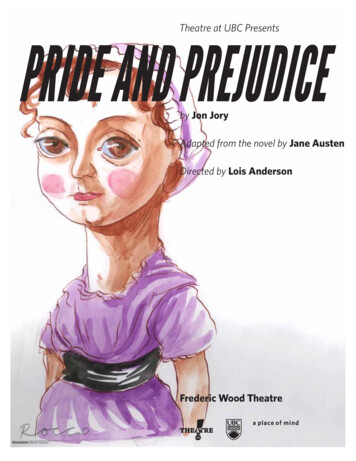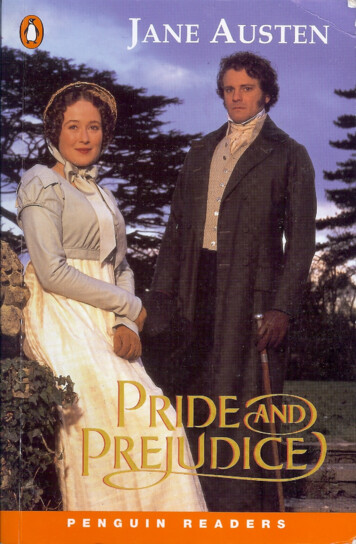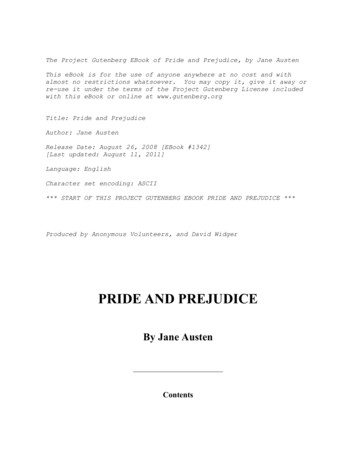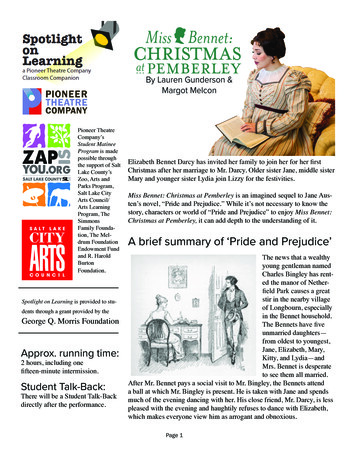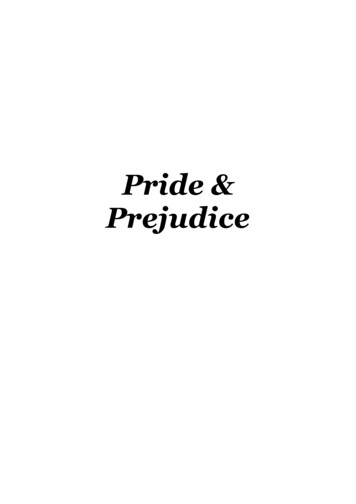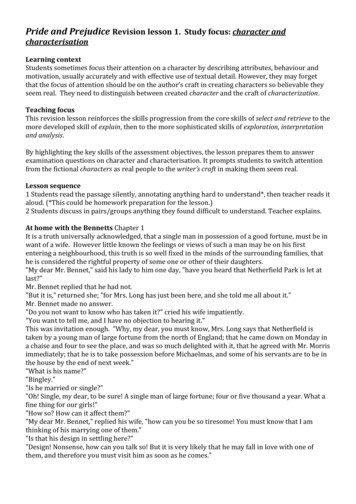
Transcription
Pride and Prejudice Revision lesson 1. Study focus: character andcharacterisationLearning contextStudents sometimes focus their attention on a character by describing attributes, behaviour andmotivation, usually accurately and with effective use of textual detail. However, they may forgetthat the focus of attention should be on the author’s craft in creating characters so believable theyseem real. They need to distinguish between created character and the craft of characterization.Teaching focusThis revision lesson reinforces the skills progression from the core skills of select and retrieve to themore developed skill of explain, then to the more sophisticated skills of exploration, interpretationand analysis.By highlighting the key skills of the assessment objectives, the lesson prepares them to answerexamination questions on character and characterisation. It prompts students to switch attentionfrom the fictional characters as real people to the writer’s craft in making them seem real.Lesson sequence1 Students read the passage silently, annotating anything hard to understand*, then teacher reads italoud. (*This could be homework preparation for the lesson.)2 Students discuss in pairs/groups anything they found difficult to understand. Teacher explains.At home with the Bennetts Chapter 1It is a truth universally acknowledged, that a single man in possession of a good fortune, must be inwant of a wife. However little known the feelings or views of such a man may be on his firstentering a neighbourhood, this truth is so well fixed in the minds of the surrounding families, thathe is considered the rightful property of some one or other of their daughters."My dear Mr. Bennet," said his lady to him one day, "have you heard that Netherfield Park is let atlast?"Mr. Bennet replied that he had not."But it is," returned she; "for Mrs. Long has just been here, and she told me all about it."Mr. Bennet made no answer."Do you not want to know who has taken it?" cried his wife impatiently."You want to tell me, and I have no objection to hearing it."This was invitation enough. "Why, my dear, you must know, Mrs. Long says that Netherfield istaken by a young man of large fortune from the north of England; that he came down on Monday ina chaise and four to see the place, and was so much delighted with it, that he agreed with Mr. Morrisimmediately; that he is to take possession before Michaelmas, and some of his servants are to be inthe house by the end of next week.""What is his name?""Bingley.""Is he married or single?""Oh! Single, my dear, to be sure! A single man of large fortune; four or five thousand a year. What afine thing for our girls!""How so? How can it affect them?""My dear Mr. Bennet," replied his wife, "how can you be so tiresome! You must know that I amthinking of his marrying one of them.""Is that his design in settling here?""Design! Nonsense, how can you talk so! But it is very likely that he may fall in love with one ofthem, and therefore you must visit him as soon as he comes."
"I see no occasion for that. You and the girls may go, or you may send them by themselves, whichperhaps will be still better, for as you are as handsome as any of them, Mr. Bingley may like you thebest of the party.""My dear, you flatter me. I certainly have had my share of beauty, but I do not pretend to beanything extraordinary now. When a woman has five grown-up daughters, she ought to give overthinking of her own beauty.""In such cases, a woman has not often much beauty to think of.""But, my dear, you must indeed go and see Mr. Bingley when he comes into the neighbourhood.""It is more than I engage for, I assure you.""But consider your daughters. Only think what an establishment it would be for one of them. SirWilliam and Lady Lucas are determined to go, merely on that account, for in general, you know,they visit no newcomers. Indeed you must go, for it will be impossible for us to visit him if you donot.""You are over-scrupulous, surely. I dare say Mr. Bingley will be very glad to see you; and I will senda few lines by you to assure him of my hearty consent to his marrying whichever he chooses of thegirls; though I must throw in a good word for my little Lizzy.""I desire you will do no such thing. Lizzy is not a bit better than the others; and I am sure she is nothalf so handsome as Jane, nor half so good-humoured as Lydia. But you are always giving her thepreference.""They have none of them much to recommend them," replied he; "they are all silly and ignorant likeother girls; but Lizzy has something more of quickness than her sisters.""Mr. Bennet, how can you abuse your own children in such a way? You take delight in vexing me.You have no compassion for my poor nerves.""You mistake me, my dear. I have a high respect for your nerves. They are my old friends. I haveheard you mention them with consideration these last twenty years at least.""Ah, you do not know what I suffer.""But I hope you will get over it, and live to see many young men of four thousand a year come intothe neighbourhood.""It will be no use to us, if twenty such should come, since you will not visit them.""Depend upon it, my dear, that when there are twenty, I will visit them all."Mr. Bennet was so odd a mixture of quick parts, sarcastic humour, reserve, and caprice, that theexperience of three-and-twenty years had been insufficient to make his wife understand hischaracter. Her mind was less difficult to develop. She was a woman of mean understanding, littleinformation, and uncertain temper. When she was discontented, she fancied herself nervous. Thebusiness of her life was to get her daughters married; its solace was visiting and news.Discuss/Write about the following:3 Select and retrieve (textual detail)3a) Which phrases used by Mr Bennett and Mrs Bennett indicate his special relationship withLizzie?3b) What makes the reader think that Mrs Bennett considers herself good-looking?4 Explain (extended textual detail)4a) Austen writes that Mr Bennett’s first three responses to his wife’s talk are: “Mr. Bennet repliedthat he had not”, “Mr. Bennett made no answer” and "You want to tell me, and I have no objection tohearing it." What do these responses suggest about the relationship between the two?4b) What does Austen suggest about Mr Bennett when she makes him say, “I have a high respect foryour nerves. They are my old friends. I have heard you mention them with consideration these lasttwenty years at least."Explain (a character’s motive, relationship or situation)4b) Why do you think Mrs Bennett is so keen for her daughters to be married?
4c) Why do you think Mr Bennett does not share her keenness for their daughters to be married?5 Explore, interpret, analyse (writer’s craft and purpose, and effects on readers)5a) At the end of this chapter of dramatic dialogue, Austen writes a descriptive statement about Mrand Mrs Bennett. How has she used dialogue to illustrate Mr Bennett’s mixture of “quick parts,sarcastic humour, reserve, and caprice”?5b) How has Austen used dialogue to illustrate Mrs Bennett’s “mean understanding, littleinformation, and uncertain temper. When she was discontented, she fancied herself nervous”?Support (knowledge & understanding)Gloss: four or five thousand a year - , a large income – equivalent to about 400.000 US dollars todaychaise and four- a closed three or four seater carriage drawn by four horses (so expensive tomaintain), Michaelmas – a religious festival on 29th September, over-scrupulous – too fussy, vexing annoying, caprice – a silly impulse, solace - comfort,Fill background: at the time the novel was written, English law prescribed family inheritancethrough the male family members, even if they were less close family than daughters. Youngwomen of affluent families were not expected to earn their own living, so marriage was the bestway of ensuring a comfortable existence if they had no wealth of their own.Reinforce: “Under exclusively man-made laws women have been reduced to the most abject conditionof legal slavery in which it is possible for human beings to be held.under the arbitrary domination ofanother's will, and dependent for decent treatment exclusively on the goodness of heart of the individualmaster.” (From a speech by Florence Miller (1854-1935) to the National Liberal Club, 1890)Stretch (independently developed knowledge & understanding)How do you respond to the nineteenth century view of women expressed in the poem below?Woman’s RightsThe right to be a comforter,When other comforts fail;The right to cheer the drooping heartWhen troubles most assail.The right to train the infant mind,To think of Heaven and God;The right to guide the tiny feetThe path our saviour trod.The right to solace the distressed,To wipe the mourner’s tear;The right to shelter the oppressedAnd gently chide each fear.The right to be a bright sunbeam,In high or lowly home;The right to smile with loving gleamAnd point to joys to come.The right to fan the fevered brow,To ease the troubled mind;And gently tell in accents low,“All those that seek shall find”.Such are the noblest woman’s rights,The rights that God hath given,The right to comfort man on earthAnd smooth his path to heaven.MCMR
Pride and Prejudice Revision lesson 2. Study focus: ideas, attitudes andfeelingsLearning contextStudents are generally confident in writing about feelings, especially characters’ feelings. They areless confident about the more abstract notion of ideas and the more social notion of attitudes.They need to develop confidence in writing about ideas, attitudes and feelings in the text, in thewriter’s mind and in themselves - depending on what the question asks.Teaching focusThis lesson reinforces the skills progression from the core skills of select and retrieve to the moredeveloped skill of explain, to the more complex skills of exploration, interpretation and analysis.The lesson helps students to consider ideas, attitudes and feelings in relation to characters in thetext, in relation to a wider relevance, and in relation to themselves as readers or audience. Ithighlights the differences between feelings, ideas and attitudes.a) Ideas relate to Thinking and Understanding. They are usually formalised concepts or notions – often expressedas nouns (e.g. Democracy, Socialism, Equality or loneliness, cruelty, conformity, culture and identity.)b) Feelings relate to occasional personal and emotional states of well-being or ill-being – usually expressed asnouns or adjectives – fear/afraid, happiness/happy, sadness/sad, anger/angry, jealousy/jealous,ambition/ambitiousc) Attitudes relate to consistently conscious or unconscious behaviours in response to ideas, events, people andsituations. They are a typical part of individual personality or a typical part of a culture or social group. Theyare usually expressed as adjectives e.g. suspicious, hostile, trusting, sceptical, acceptant, passive, aggressive (atthe conscious level, they may develop from ideas: at the unconscious level, from feelings)Lesson sequence1 Students read the passage silently, annotating anything not understood*, then teacher readsaloud. (*This could be homework preparation for the lesson.)2 Students discuss anything they found difficult to understand. Teacher explains.Mr Darcy proposes from Chapter 34(Elizabeth) was suddenly roused by the sound of the door-bell to her utter amazement, she sawMr. Darcy walk into the room. In an hurried manner he immediately began an inquiry after herhealth, imputing his visit to a wish of hearing that she were better. She answered him with coldcivility. He sat down for a few moments, and then getting up, walked about the room. Elizabeth wassurprised, but said not a word. After a silence of several minutes, he came towards her in anagitated manner, and thus began:"In vain I have struggled. It will not do. My feelings will not be repressed. You must allow me to tell youhow ardently I admire and love you."Elizabeth's astonishment was beyond expression. She stared, coloured, doubted, and was silent.This he considered sufficient encouragement; and the avowal of all that he felt, and had long felt forher, immediately followed. He spoke well; but there were feelings besides those of the heart to bedetailed; and he was not more eloquent on the subject of tenderness than of pride. His sense of herinferiority—of its being a degradation—of the family obstacles which had always opposed toinclination, were dwelt on with a warmth which seemed due to the consequence he was wounding,but was very unlikely to recommend his suit.In spite of her deeply-rooted dislike, she could not be insensible to the compliment of such a man'saffection, and though her intentions did not vary for an instant, she was at first sorry for the pain hewas to receive; till, roused to resentment by his subsequent language, she lost all compassion inanger. She tried, however, to compose herself to answer him with patience, when he should havedone. He concluded with representing to her the strength of that attachment which, in spite of allhis endeavours, he had found impossible to conquer; and with expressing his hope that it would
now be rewarded by her acceptance of his hand. As he said this, she could easily see that he had nodoubt of a favourable answer. He spoke of apprehension and anxiety, but his countenanceexpressed real security. Such a circumstance could only exasperate farther, and, when he ceased,the colour rose into her cheeks, and she said:"In such cases as this, it is, I believe, the established mode to express a sense of obligation for thesentiments avowed, however unequally they may be returned. It is natural that obligation should befelt, and if I could feel gratitude, I would now thank you. But I cannot—I have never desired your goodopinion, and you have certainly bestowed it most unwillingly. I am sorry to have occasioned pain toanyone. It has been most unconsciously done, however, and I hope will be of short duration. Thefeelings which, you tell me, have long prevented the acknowledgment of your regard, can have littledifficulty in overcoming it after this explanation."Mr. Darcy, who was leaning against the mantelpiece with his eyes fixed on her face, seemed to catchher words with no less resentment than surprise. His complexion became pale with anger, and thedisturbance of his mind was visible in every feature. He was struggling for the appearance ofcomposure, and would not open his lips till he believed himself to have attained it. The pause wasto Elizabeth's feelings dreadful. At length, with a voice of forced calmness, he said:"And this is all the reply which I am to have the honour of expecting! I might, perhaps, wish to beinformed why, with so little endeavour at civility, I am thus rejected. But it is of small importance."Discuss in pairs or groups or write about the following:3 Select and retrieve (textual detail)3a) Which words indicate that Elizabeth received Darcy politely but without warmth?3b) Which words convey Darcy’s difficulty in speaking and feeling of disturbance?4 Explain (extended textual detail)4a) “She was at first sorry for the pain he was to receive; till, roused to resentment by his subsequentlanguage, she lost all compassion in anger.” How would you explain the change in Elizabeth’sfeelings at this point?4b) ‘He spoke of apprehension and anxiety, but his countenance expressed real security.’ What doesAusten mean by this contrast?Explain (a character’s ideas, attitudes, feelings)4c) Why does Darcy think Elizabeth is inferior to him, and marrying her would be a “degradation”?4d) Darcy thinks that Elizabeth’s reply shows “little endeavour at civility”. How does Elizabeth trynot to make her refusal seem angry or rude?5 Interpret, explore, analyse (writer’s craft and purpose and effects on readers)5a) How much sympathy do you have with a) Elizabeth and b) Darcy in this extract?5b) How does Austen show Darcy’s lack of understanding of Elizabeth’s likely response?5c) What does Austen’s narrative detail add to the dialogue to convey attitudes and feelings?Support: (knowledge & understanding)Gloss: imputing – explaining, putting down to, civility – politeness, avowal – claim or promise,degradation – lowering or shaming, compassion – pity, endeavours – efforts, bestowed – given.Fill background: At their first meeting, Elizabeth heard Darcy say to Mr Bingley “She is tolerable butnot quite handsome enough to tempt me”. Later, she was told by Wickham that Darcy had treatedhim badly. Austen has made both of them influenced by pride and by prejudice.Reinforce: How would students feel if someone made them a proposal which began by saying “I loveyou even though you are my inferior and it would lower my status to marry you”?Stretch (independent application and development of knowledge & understanding)Compare Mr Collins’ proposal with Darcy’s proposal. What do they have in common?
Pride and Prejudice Revision lesson 3. Study focus: languageLearning contextStudents often approach a question on language with a prepared list of devices they are determinedto identify in what they read. This can help weaker students to remember some technical featuresthat may show some specialist knowledge. However, more successful responses show the ability toconnect expression with purpose, meaning and effect. Students need to show why the writer hasmade specific language choices and what effect those choices have on the text and on the reader.Teaching focusThis lesson reinforces the skills progression from the core skills of select and retrieve to the moredeveloped skill of explain, then to the more sophisticated skills of exploration, interpretation andanalysis.The lesson prompts students to notice Austen’s purposeful patterning in words and ideas, and inwords and feelings. It also reinforces their understanding of how dialogue can be made a strongfeature of individual characterization. By highlighting the key skills of literary reading assessment,the lesson prepares them to answer examination questions on language as part of Austen’s craftand presentation.Lesson sequence1 Students read the passage silently, annotating anything hard to understand*, then teacher readsaloud. (*This could be homework preparation for the lesson.)2 Students discuss in pairs/groups anything they found hard to understand. Teacher explains.Mr Collins proposes from Chapter 19“You can hardly doubt the purport of my discourse, however your natural delicacy may lead you todissemble; my attentions have been too marked to be mistaken. Almost as soon as I entered thehouse, I singled you out as the companion of my future life. But before I am run away with by myfeelings on this subject, perhaps it would be advisable for me to state my reasons for marrying—and, moreover, for coming into Hertfordshire with the design of selecting a wife, as I certainly did.""My reasons for marrying are, first, that I think it a right thing for every clergyman in easycircumstances (like myself) to set the example of matrimony in his parish; secondly, that I amconvinced that it will add very greatly to my happiness; and thirdly—which perhaps I ought to havementioned earlier, that it is the particular advice and recommendation of the very noble lady whomI have the honour of calling patroness. Twice has she condescended to give me her opinion(unasked too!) on this subject; and it was but the very Saturday night before I left Hunsford—between our pools at quadrille, while Mrs. Jenkinson was arranging Miss de Bourgh's footstool, thatshe said, 'Mr. Collins, you must marry. A clergyman like you must marry. Choose properly, choose agentlewoman for my sake; and for your own, let her be an active, useful sort of person, not broughtup high, but able to make a small income go a good way. This is my advice. Find such a woman assoon as you can, bring her to Hunsford, and I will visit her.' Allow me, by the way, to observe, myfair cousin, that I do not reckon the notice and kindness of Lady Catherine de Bourgh as among theleast of the advantages in my power to offer. You will find her manners beyond anything I candescribe; and your wit and vivacity, I think, must be acceptable to her, especially when temperedwith the silence and respect which her rank will inevitably excite. Thus much for my generalintention in favour of matrimony; it remains to be told why my views were directed towardsLongbourn instead of my own neighbourhood, where I can assure you there are many amiableyoung women. But the fact is, that being, as I am, to inherit this estate after the death of yourhonoured father (who, however, may live many years longer), I could not satisfy myself withoutresolving to choose a wife from among his daughters, that the loss to them might be as little aspossible, when the melancholy event takes place—which, however, as I have already said, may not
be for several years. This has been my motive, my fair cousin, and I flatter myself it will not sink mein your esteem. And now nothing remains for me but to assure you in the most animated languageof the violence of my affection. To fortune I am perfectly indifferent, and shall make no demand ofthat nature on your father, since I am well aware that it could not be complied with; and that onethousand pounds in the four per cents, which will not be yours till after your mother's decease, isall that you may ever be entitled to. On that head, therefore, I shall be uniformly silent; and you mayassure yourself that no ungenerous reproach shall ever pass my lips when we are married."It was absolutely necessary to interrupt him now."You are too hasty, sir," she cried. "You forget that I have made no answer. Let me do it withoutfurther loss of time. Accept my thanks for the compliment you are paying me. I am very sensible ofthe honour of your proposals, but it is impossible for me to do otherwise than to decline them.""I am not now to learn," replied Mr. Collins, with a formal wave of the hand, "that it is usual withyoung ladies to reject the addresses of the man whom they secretly mean to accept, when he firstapplies for their favour; and that sometimes the refusal is repeated a second, or even a third time. Iam therefore by no means discouraged by what you have just said, and shall hope to lead you to thealtar ere long.""Upon my word, sir," cried Elizabeth, "your hope is a rather extraordinary one after my declaration.I do assure you that I am not one of those young ladies (if such young ladies there are) who are sodaring as to risk their happiness on the chance of being asked a second time. I am perfectly seriousin my refusal. You could not make me happy, and I am convinced that I am the last woman in theworld who could make you so. Nay, were your friend Lady Catherine to know me, I am persuadedshe would find me in every respect ill qualified for the situation.""Were it certain that Lady Catherine would think so," said Mr. Collins very gravely—"but I cannotimagine that her ladyship would at all disapprove of you. And you may be certain when I have thehonour of seeing her again, I shall speak in the very highest terms of your modesty, economy, andother amiable qualification.""Indeed, Mr. Collins, all praise of me will be unnecessary. You must give me leave to judge formyself, and pay me the compliment of believing what I say. I wish you very happy and very rich,and by refusing your hand, do all in my power to prevent your being otherwise. In making me theoffer, you must have satisfied the delicacy of your feelings with regard to my family, and may takepossession of Longbourn estate whenever it falls, without any self-reproach. This matter may beconsidered, therefore, as finally settled." And rising as she thus spoke, she would have quitted theroom, had Mr. Collins not thus addressed her:"When I do myself the honour of speaking to you next on the subject, I shall hope to receive a morefavourable answer than you have now given me; though I am far from accusing you of cruelty atpresent, because I know it to be the established custom of your sex to reject a man on the firstapplication, and perhaps you have even now said as much to encourage my suit as would beconsistent with the true delicacy of the female character.""Really, Mr. Collins," cried Elizabeth with some warmth, "you puzzle me exceedingly. If what I havehitherto said can appear to you in the form of encouragement, I know not how to express myrefusal in such a way as to convince you of its being one.""You must give me leave to flatter myself, my dear cousin, that your refusal of my addresses ismerely words of course. My reasons for believing it are briefly these: It does not appear to me thatmy hand is unworthy of your acceptance, or that the establishment I can offer would be any otherthan highly desirable. My situation in life, my connections with the family of de Bourgh, and myrelationship to your own, are circumstances highly in my favour; and you should take it into furtherconsideration, that in spite of your manifold attractions, it is by no means certain that another offerof marriage may ever be made you. Your portion is unhappily so small that it will in all likelihoodundo the effects of your loveliness and amiable qualifications. As I must therefore conclude that youare not serious in your rejection of me, I shall choose to attribute it to your wish of increasing mylove by suspense, according to the usual practice of elegant females.""I do assure you, sir, that I have no pretensions whatever to that kind of elegance which consists intormenting a respectable man. I would rather be paid the compliment of being believed sincere. I
thank you again and again for the honour you have done me in your proposals, but to accept themis absolutely impossible. My feelings in every respect forbid it. Can I speak plainer? Do not considerme now as an elegant female, intending to plague you, but as a rational creature, speaking the truthfrom her heart.""You are uniformly charming!" cried he, with an air of awkward gallantry; "and I am persuaded thatwhen sanctioned by the express authority of both your excellent parents, my proposals will not failof being acceptable."Discuss or Write about the following:3 Select and retrieve (textual detail)3a) Which word suggest that Lady Catherine was generous in bothering to give an opinion tosomeone of lower status?3b) Which phrase shows Mr Collins’ final belief that Elizabeth’s parents will have some right toinfluence her choice of husband?4 Explain (extended textual detail)4a) What are Mr Collins three reasons for marrying?4b) Mr Collins thinks that Lizzie has “wit and vivacity”, but he thinks that these qualities should besecondary to two others. What are they?Explain (language, purpose and effect)4c) How does Lizzie’s first response to the proposal show her attempt to be polite and civil?4d) How does her second response show more annoyance and directness?4e) How does Mr Collins show complete misunderstanding of Lizzie after her third response?Interpret, explore, analyse (writer’s craft and effects on readers)5a) Language and characters’ feelings and attitudesMake a list of the pronouns “I”, “me” and “my” in Mr Collins’ speech in this extract and comparewith the frequency of “you” and “your”. What does this frequency suggest to you?5b) Language in narrative and dialogue:Nearly all of this extract is dialogue, as if Austen is writing a realistic drama script rather than astory. There are only 8 examples of narrative statement in the whole extract. What do they add tothe presentation of Mr Collins’ attitudes and Elizabeth’s feelings?Support (knowledge & understanding)Gloss: dissemble – conceal thoughts or feelings, patroness – lady who provides financial backing,pools at quadrille – a dance requiring four pairs of men and women, vivacity - liveliness, melancholy– sadness, indifferent – not interested, gravely - seriously, amiable - likeable, gallantry – malerespect for women.Fill background: When Mr Collins first decided he would propose to one of the Bennett girls, hechose Jane, but was told that she was likely soon to be engaged to Mr Bingley. He then swiftlychanged his plans to make Lizzie the object of his interest.Reinforce: What would students feel about a proposal which uses the phrase “when we aremarried”?Stretch (independently developed knowledge & understanding)Compare the way Austen presents Elizabeth’s situation and response in this extract with Mr Elton’sproposal to Emma in the novel Emma.
Pride and Prejudice Revision lesson 4. Study focus: structureLearning contextStudents sometimes confuse a focus on structure with a focus on identified stylistic devices such asiambic pentameter, extended simile, alliteration etc. They need to understand structure within apassage and within the text as a whole as something more than style – something which shows awriter’s planning.Teaching focusThis lesson reinforces the skills progression from the core skills of select and retrieve to the moredeveloped skill of explain, then to the more sophisticated skills of exploration, interpretation andanalysis.The lesson reinforces understanding of dramatic textual structure as a) character and plotdevelopment b) mood, theme, action variety to appeal to an audience. It prompts students to see apassage in the context of the whole novel, and as part of a writer’s planning for reader interest andappeal. By highlighting the key skills of the assessment objectives, the lesson prepares them toanswer examination questions on aspects of Austen’s dramatic craft.Lesson sequence1 Students read the passage silently, annotating anything they don’t understand*, then teacherreads aloud. (*This could be a homework preparation for the lesson.)2 Students discuss in pairs/groups anything they found difficult to understand. Teacher explains.Lizzie is invited to look around Darcy’s home by the housekeeper from Chapter 43The rooms were lofty and handsome, and t
Pride and Prejudice Revision lesson 2. Study focus: ideas, attitudes and feelings Learning context Students are generally confident in writing about feelings, especially characters' feelings. They are less confident about the more abstract notion of ideas and the more social notion of attitudes.
